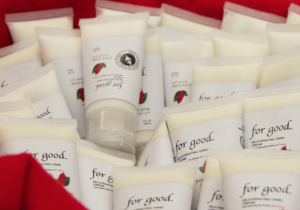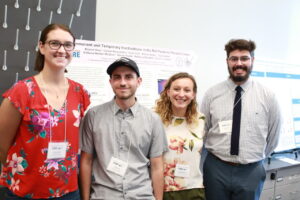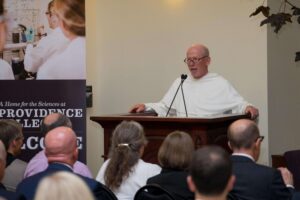Tag: science
What’s the Buzz About?
by Kaelin Ferland '23 on February 16, 2023
Opinion Staff
Eco Updates
USDA Approves First Vaccine for Bees
Recently, the United States Department of Agriculture approved a vaccine for honeybees to protect these crucial pollinators against American Foulbrood Disease, a highly contagious disease that infects bee larvae and pupae. AFB can spread quickly within honeybee colonies, as well as to other hives, making it particularly dangerous.
Bees have great ecological importance. Without bees, flowering plants and trees wouldn’t be pollinated, causing sharp declines in global biodiversity. Three-quarters of the plants on our planet are flowering species, meaning that without bees, we would lose 75 percent of the world’s plants. Bees are also vital for food production, pollinating around 35 percent of the food we eat. If bees disappeared or went extinct, we would be unable to survive.
AFB affects honeybee colonies via spores. If these bacterial spores enter hives and infect larvae and pupae, the colony could collapse within a matter of weeks. When bees feed larvae food contaminated by these spores, the disease is transmitted to the developing bees. Once consumed, the spores multiply within the larvae and kill them. During development, larvae inhabit honeycomb cells in the hive. When an infected larva dies, it needs to be cleaned out by worker bees. The cleaning process causes the release of more spores, infecting and killing countless other larvae in the hive.
How will the vaccine be administered to these tiny insects? Instead of injecting the vaccines into bees using miniature syringes, the vaccine will be incorporated into the queen bee’s food. Honeybees have a unique method of deciding which female becomes the queen. Multiple female larvae will be fed “royal jelly,” a nutrient-rich substance that causes ovary formation. This ensures that the queen bee is the only female that can reproduce in the colony. Whichever female larva emerges first becomes the queen and consumes the female larvae that have yet to hatch.
Bee biology differs from that of most organisms because the queen bee is the only one to reproduce in the colony. This means that all of the bees in the hive are genetically related. When the queen bee ingests the AFB vaccine it will enter her ovaries and will be passed onto her offspring. Thus, the vaccine will only need to be administered to the queen in new colonies.
Recent reports have stated that over the past 25 years, the Colorado honeybee population has decreased by over 72 percent. According to a study conducted by Bee Informed and beekeepers across the US, from April 2020 to April 2021, 45.5 percent of honeybee colonies across the country were lost. These declines are mainly due to climate change, habitat loss, and fragmentation, pesticides, and parasites; however, these statistics could in part be linked to AFB, which is why this new vaccine is so important. Additionally, the vaccine could pave the way for further research into different bee illnesses to see if we can develop more vaccines for other threatening diseases. In the meantime, while AFB continues to have a devastating effect on honeybee colonies, this vaccine will be essential in helping to preserve arguably the most important species on the planet.
Using Science “For Good” Measure: PC Staff Develops New Hand Cream
by The Cowl Editor on March 5, 2020
Campus

by Eileen Cooney ’23
Assistant News Editor
The For Good hand cream project started a year and a half ago as a vision for a business project in an MBA class taught by Dr. Helen M. Caldwell, assistant professor of marketing, here at Providence College.
Fr. Nicanor Austriaco, O.P., and Dr. Robert J. Camp teamed up to design the product after Rev. Nicanor Austriaco, O.P., read about an extract from the Tiberian root that has anti-aging properties. They developed a plan to create a hand cream after presenting it to their professor, Dr. Caldwell; Campbell loved it.
Since last October they have been developing the cream, and now they are in the marketing phase.
Originally, the hand cream was going to be called “forever,” but unfortunately that name was already taken. Last year, the project was adopted in an MBA marketing class by a group of students to be used as the focus of their semester project. The students named the hand cream For Good and Fr. Nicanor and his partner Dr. Camp went for it.
The hand cream is created in a little “kitchen” laboratory in the basement of Albertus Magnus Hall. It is a room that was used by construction workers when the new science building was being built, but Fr. Nicanor and his team of students now rent the space from the College for $1 a year. Here is where all the action takes place.
Students working in the lab help Fr. Nicanor, and for their services they get paid minimum wage. After the cream has been concocted in the lab, part of the students’ duties involve filling the plastic tubes, printing out labels, and applying the labels. The students involved in the project will also get an opportunity to be a part of the expansion of the For Good body products. Fr. Nicanor said a body butter and a serum are in the works for the future.
Additionally, Fr. Nicanor is searching for new student employees who would be willing to work on the project for minimum wage, specifically an English major who would be able to write a market campaign and a graphic designer who would be able help with art and design. Anyone interested is encouraged to contact him.
The goal of this project, says Fr. Nicanor, is to “set up a business labs experience for students interested in entrepreneurship in the same way that we have science lab for science majors.”
Currently, the hand cream is available for sale in the bookstore and on the bookstore’s website. Ten percent of the proceeds from sales of the hand cream are used to fund Fr. Nicanor’s student run lab that researches genes involved in skin cancer. In this way, a portion of the proceeds from the hand cream are going to be indirectly funding skin cancer research.
Fr. Nicanor also encourages all PC students to keep up with the For Good project on Instagram. Every day they will be posting pictures of the hand cream at different locations around campus, and there will be chances for students to enter contests to win free products. Additionally, pop-up shops in Slavin, Harkins, and the Ryan Center, will be coming soon so that students can try the product and purchase it.
Science After-Hours: Friars Conduct Summer Resarch Projects on PC Campus
by The Cowl Editor on August 29, 2019
Campus

Alexandra Huzyk ’20
News Staff
Throughout the summer of 2019, a variety of different science departments at Providence College conducted multiple research projects.
A few areas of concentration included molecular and evolutionary biology, genetics, neurobiology, population and conservation biology, cancer cell metabolism, stem cell biology, and computational organic chemistry.
In the biology department, Alexis Rabbitt ’20 conducted research with Dr. Pamela Snodgrass-Belt ’91 on the circadian rhythms in Drosophila—commonly known as fruit flies. Rabbitt explains, “A circadian rhythm is the body’s internal clock that controls things like the sleep and wake cycle.”
“My research focuses on the quantification of the expression of the clock, time, and per genes that play an essential role in the regulation of circadian rhythm,” says Rabbitt. The purpose of this research, Rabbitt continues, is to determine how circadian rhythms fluctuate throughout the day and how they affect oxidation rates.
A normal day for Rabbitt included running polymerase chain reactions, freezing flies at different times during the day, dissecting fly heads to extract RNA, and measuring gene expression. “This research has important implications in the lives of shift workers who experience elevated risk of type two diabetes, obesity, and other chronic illness.”
After volunteering in Dr. Snodgrass-Belt’s lab, Rabbitt says, “I chose to do research for class credit and over the summer because I really enjoyed experiencing the more hands-on aspect of biology.” Rabbitt will continue to conduct research throughout the school year, and plans on applying to medical school in the future.
“This research taught me to apply the biology I learn in lecture to real life,” says Rabbitt. “This will help me in the future by allowing me to think of biology on a broader scale, especially when it comes to medicine and applying biological concepts to human patients.”
Kyle Medas ’20, a biochemistry major, became involved in research during the summer following his freshman year. He says, “I chose to do research because I knew that the experience I would obtain from being in a research lab would be much different than a lab from my courses.”
During this past summer, Medas completed his third year of research in Dr. Seann Mulcahy’s lab. Medas says that the focus of this particular lab was to research,“possible strategies to synthesize a class of molecules known as alpha-carbolines.”
Robert Lesch ’20, another student working in Mulcahy’s lab, explains, “The main point of this research is to increase the efficiency of alpha carbs, as all of our work is methodological,” and, “potentially lead researchers into finding applications of alpha carbs as pharmaceuticals.”
“My role in the lab would be to perform the desired reaction, work up the product mixture, then purify the desired product from other side-products,” says Medas. “From here, we analyze the product to determine if it is actually what we want, then move forward with further reactions.”
Medas will continue conducting research within Mulcahy’s lab, and hopes to have his work published. He says, “the experience I have gained from research will allow me to enter future labs with the knowledge of essential techniques.” In the future, Medas hopes to attend graduate school and eventually obtain a Ph.D. in chemistry.
Students who wish to participate in research are encouraged to consult with faculty who specialize in areas that they are interested in.
Science Complex Opening Kicks Off St. Dominic’s Weekend
by The Cowl Editor on October 4, 2018
Campus
Nicholas Crenshaw ’20/TheCowl
by Hannah Langley ’21
News Co-Editor
Besides being known for its liberal arts education, Providence College also boasts its science department, which offers a large variety of science-based majors. This past Friday, September 28, PC officially unveiled the new Science Complex to the public as part of the celebration of St. Dominic’s Weekend.
The unveiling began with a speech from Kelly Page ’93 titled “Beyond Blackboards and White Coats: An Uncommon Career in Science.” Page was asked to give this speech as part of the Anna E. Lavoie Memorial Lecture Series, an annual speech and dedication that began last year.
Page was not only a biology and chemistry double major, but was also part of PC’s rigorous Liberal Arts Honors Program. She currently works as the vice president of the German oncology business unit at Takeda Oncology, a growing and successful pharmaceutical business.
In her speech, Page emphasized that her current position is not where she started and, most importantly, is not where she saw herself when she graduated. Page talked about how during her senior year at PC, she decided she did not want to attend medical school, which had been her original goal, and instead came out of college to work for a family friend at Pfizer, one of the world’s largest pharmaceutical companies.
It was here that Page realized there was more to the field of science than, as she put it “blackboards, teaching, and lab coats,” or, in other words, teaching or working in a laboratory for hours on end.
She explained the different categories of the pharmaceutical company, which includes research, development, and commercialism, and explained how she realized how many departments were actually included in each of these categories.
“There are so many other opportunities you never knew existed,” said Page, emphasizing the idea that she didn’t figure out what she was truly passionate about until later on in her career. “You don’t always know what you’re going to do,” Page continued, “science is just the foundation.”
In 1999, Page’s life was dramatically altered by the diagnosis of three of her loved ones, including her father, with lymphoma, a cancer that affects the lymphatic system, which acts to fight diseases in the body.
It was at this time in her life that Page decided she wanted to work in oncology, the study of cancer, and help in the development of drugs that fight cancer. “My passion became to find the cure for cancer,” said Page. This passion then led her to become the project manager of oncology at Pfizer and, later, the same position at Takeda Oncology.
Page talked about why she loved being a project manager, saying, “The cross-functional nature of the team excited and energized me about my job.”
She also shared that her interest with project management and the business aspect of pharmaceuticals intrigued her, leading her to the decision of returning to school to graduate with an MBA in project management from the University of Rhode Island in 2002.
Page also talked about why she was more interested in the business and commercial end of the pharmaceutical industry than other roles, saying, “Commercial is where you make the drug accessible, and I liked that better than the internal work.” She continued, explaining, “A lot of what I do is think of what patients need and what caregivers need.”
Page says the impact of her work is what makes it so exciting for her every day. She explained how she chose the pharmaceutical industry, saying, “It comes down to the impact you have. The broad reach is unmatched by any other industry.”
Not only did Page talk about her experience beyond PC, but she also mentioned how what she learned at PC impacts her today.
“People would tell me I ‘think differently,’” Page explained, and she attributed this to her liberal-arts based education. “Civ teaches you how to integrate ideas, which is exactly what you do on a cross-functional team,” said Page.
She encouraged the science majors present at the speech to use the skills they learn at PC in their careers throughout their lives.
The speech was then followed by a blessing, a ribbon cutting ceremony, and a dinner in honor of the new Science Complex.
Dr. Charles Toth, associate professor and chair of the biology department, noted his enthusiasm for the new facilities. He said the renovation was long overdue, and is excited for the improvements that are to come in the next few years.

